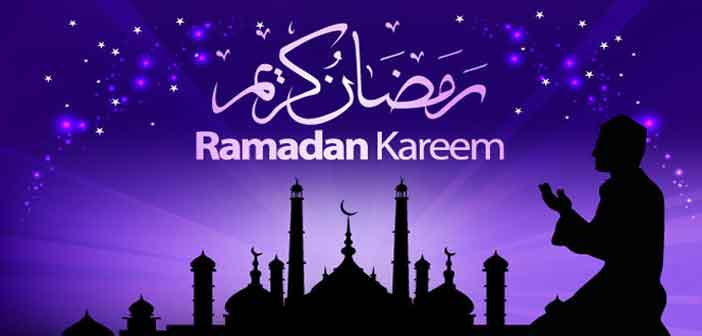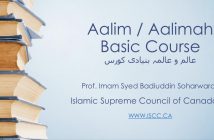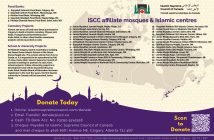Self-control is one of the most desirable characteristics of human behaviour. Under the influence of temptation, greed, anger or fear, a person may exhibit behaviour that may disturb the peace in the society. Self-control helps a person to stay in peace at the time of distress, temptation and anger. Our Creator, almighty God (Allah) wants us to adopt the behaviour of the most peaceful residents of this earth. Therefore, Islam says that the achievement of the inner and the outer peace should be the goal of every human being. Islam not only talks about it but also provides a complete manual / road map including various tools to achieve this goal.
Qur’an is the manual / road map and fasting is one of the important tools of Islam for achieving inner and outer peace by developing self-control. As Allah says in Qur’an,
” O’ who believe, fasting is prescribed to you As it was prescribed to those before you, That you may (learn) Self-restraint. (2:183) “.
Anniversary of the Holy Qur’an
Ramadan is the anniversary month of the holy Qur’an. As Allah said in Qur’an,
” The month of Ramadan is the month in which the Qur’an was sent down, a guidance for the people, and clear verses of guidance and criterion “.(2, 185)
In Ramadan, at night, Muslims offer special prayers called TARAWEEH. All over the world, these prayers are offered in congregations and the memorizers of the Qur’an, HAFIZ, read the Qur’an from the first chapter until the last chapter in 29 nights of the month of Ramadan. Qur’an is the only book in the world that is memorized by millions of human beings and they read it, in every Ramadan, word by word and verses by verses. The Muslims listen the beautiful divine music called Qira’at of the holy Qur’an from the best voices of the Muslim world. The repeated readings of this divine book instead of creating boredom creates more and more enthusiasm and love in the hearts of Muslims.
Requirements and Conditions of Fasting in Ramadan
Moon Sighting
The efforts for sighting of the crescent moon which defines the lunar months, is obligatory upon the Muslim community or a delegated institution / organization of Muslim community. Once the new moon has been sighted (i.e. the month’s beginning has been determined), its “arrival” should be proclaimed so that people may prepare to carryout the activities of that month on the right date and time. The determination of the lunar month should be by sighting the moon–it being witnessed by a Muslim known to be truthful and trustworthy. Some scholars have acceded, by the establishment of moon’s “newness” by accurate and trustworthy calculation.
Intention
It is imperative during Ramadan to make the intention to fast every night before the dawn of the following day.
Conditions of the Daily Fast
It is obligatory upon every Muslim after reaching the age of puberty to fast each day of Ramadan and not miss any fasting day intentionally. It is obligatory to make up any days for which fasting was missed unintentionally during Ramadan by fasting at a later date whether or not they had a valid excuse among which are menstruation, pregnancy, nursing a baby, illness, very old age, travel and so on. Fast days missed intentionally must be expiated by fasting for two consecutive months.
From dawn until sunset, eating or drinking invalidates the fast as does smoking, enemas etc. Rinsing the mouth with water does not invalidate the fast, however, one must take care not to swallow or inhale as one’s fast will become void. Married couples are forbidden to have intercourse whilst they are fasting. (Islam forbids any sexual relationships outside marriage).
The essence of fasting is the complete obedience of almighty Allah by staying away from any belief or action that has been forbidden by Allah. Allah has forbidden fraud, lying, murdering, robbing, cheating, gossiping, taking away the rights and freedom of human beings, terrorizing, etc.…. If someone does not eat or drink from dawn until sunset but participates in such ill-spiritual and immoral activities, his / her fast become hunger and thirst only, nothing more than this.
Pregnancy & Nursing
If a woman is pregnant or breast feeding and cannot fast on that account, fearing harm to her own health or that of her child, it is obligatory for her to fast the days that are missed later on, and according to some scholar to atone for missing the fast by feeding two meals to poor for each missed fast.
Sick and Elderly
In case of elderly (physically very weak) or permanent sick people who are unable to fast, their expiation is also the feeding of the poor with two meals for each day lost.
Travel
The traveler is not obliged to fast provided travel began before the time for the dawn prayer, the travel entailing the distance considered a condition for shortening the prayers. Missed fasts of the traveler must be made up after the end of Ramadan, but need not be expiated. In the event that a person has already started fasting, he should not break the fast when he embarks upon a journey, nor yet when he returns from a journey. There is no obligation upon a non-fasting traveler to resume the fast upon reaching their destination before the end of the fasting day, however it is preferable for the traveler to fast the entire day unless it incurs more than the usual hardship of fasting. A person is considered a traveler when he/she is planning to travel more than 57 miles. Nowadays the traveling of 57 miles is daily business for some people. Therefore, if one feels comfortable to fast even he /she travels 57 miles they can continue to fast.
Menstruation and Lochia
If a woman is menstruating or is bleeding due to childbirth (Lochia), fasting is not valid until the menstruation ceases. Days missed by her can be made up anytime after the end of Ramadan during the year before the next Ramadan commences.
Other Requirements
A person who has the intention to fast, he / she should eat some food before dawn, called “SAHOOR OR SAHREE”. Similarly at the sunset time, one should break the fast by eating dates (FATOOR OR AFTAAREE) in order to imitate the tradition of Prophet Muhammad (Peace be upon him). But eating date is not a requirement.
During the last ten nights of Ramadan, there is a night, what Qur’an calls, ” the night of power “, LAILATUL QADR, remembrance of almighty Allah during that night rewards a Muslim more than thousand months of worshipping.
During the last ten days and nights of Ramadan some of the Muslims go in seclusion called EITEKAAF. Men remain inside the mosque for 10 days and go out side only for emergencies or for basic needs. Women do EITEKAAF at home and specify a place in home for the EITEKAAF.
Charity
During the month of Ramadan Muslims offer charity (SADQAH) to poor and needy. Generally, most of the Muslims pay their ZAKAT (mandatory poor due) during the month of Ramadan.
At the completion of Fasting in Ramadan Muslims celebrate the festival of Eid-ul-Fitr. On the morning of Eid they eat sweets and pay another mandatory charity called SADQAH-TUL-FITR to the poor and the needy. Then they go to mosques OR the places where congregational thanksgiving prayer are offered. Children get lots of gifts and every one enjoys the festival of EID.
Ramadan is like a boot camp. After one month of spiritual and moral training, the fasting person should become a model citizen of the society and use the lessons learned of this training during the eleventh months of the remaining year.
May Allah accept our prayers and thanksgiving.






